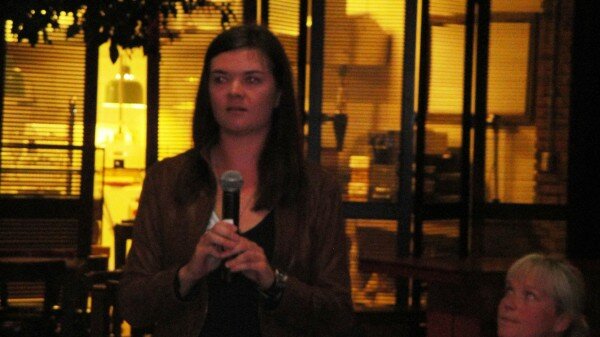
Kat Scholtz, co-founder of Quirk Ed, at the GGDCPT last week. Photo by HumanIPO.
Kat Scholtz, co-founder of South African online learning platform Quirk Education, spoke to HumanIPO about social learning, the future of online education and teacher engagement.
HumanIPO: What do you think is the next step for online education in South Africa?
Scholtz: The industry of online education…looks very different than it did one or two years ago. There are just different businesses popping up all over the place and different innovative ways of approaching the stuff.
When you talk about online education, again you are looking at a really wide field.
If I look what is happening, I am curious to see that definition, how the industry defines itself.
Is it simply about supplementary learning which means people are just interested? Is it about moving towards formal qualification, depending on the traditional structures that are actually, like government structures where qualification doesn’t always move more quickly the industry would like, but it carries a certain weight and brings a certain element that is necessary?
[The] next step I think is all about what the focus of development would be.
I am interested in e-learning not as distance learning, but as really making the information accessible.
What do you think about social learning?
As a student one of the great experiences is going to school or university in a physical space with people around you going through the same experiences.
For me as part of social learning is leaning towards where you are physically together, so you can talk about your experience. That is quite a big part of learning.
People get nervous at a distance and they are afraid about the assignments they have to do.
They don’t know how to tackle it, how to handle all this stuff. I am interested how people use that tool to support each other in learning.
I am talking about familiarising themselves (students) and…connecting with people that are doing these courses and hearing their opinion…and you get input.
That is something that happens in real time and social tools assist them…[as] part of the learning experience.
Do you think it’s the student’s responsibility to engage themselves instead of only the teacher’s?
I think it goes both ways. We focus a lot on engagement.
With online learning and distance learning, it’s inherent to it. You have to drive that in text because it is not in a physical space.
You have to read your emails, you have to log on to the chat session, you have to download your notes.
There is definitely an onus on the student but it must go both ways.
What are the main reasons you think Quirk Education is so effective?
One of the reasons it works is our feedback from students. It definitely drives us, especially on social media.
A lot of our students are really invested in our brand, we focus a lot on customer service.
Our community – we really build one. That for us, the reason I feel we really have something is the feedback we get from students about how useful it is to their jobs.
All of our content actually has to be based on the people who are actually doing it, not just academic theory.
We talk to people, they (courses) get reviewed by experts every time. You have to be relevant.
Do you think teachers could be more embracing towards technology’s use in classrooms?
I think some teachers are and some aren’t. Especially in South Africa where there is a gap in technology, it is not that easy to just say: Embrace it.
I think at universities where there is access to tools, I would be sad if people aren’t looking at the possibilities.
I think it is often easy to criticise teachers, but teachers have a lot of work as well, especially. Teachers should embrace technology but within time.
Without understanding that context, I would not step in and say they’re scared, they aren’t embracing things.
So there is opportunity, but understanding how to harness that, before you are saying this one is not doing that or that one is not engaging.

















